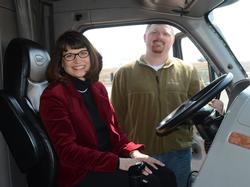Take a look at Jeanette Kersten, and you don’t think trucker. The assistant professor of operations and management for University of Wisconsin-Stout is so slight you would think she’d have a hard time climbing into the cab of an 18-wheeler, much less driving the beast on the open road. That’s that focus of Kersten’s research: to make long-haul trucks more accommodating and comfortable for women— a largely untapped, and badly needed, pool of drivers.
“Today’s trucks are not designed with women in mind,” Kersten said. “Given the driver shortage and the changing demographics that the trucking industry faces, it’s important for manufacturers to make trucks more female-friendly through moderate design changes for seats, pedals and gauges, for example.” Kersten, with the assistance of her Organization Development class graduate students, and Ellen Voie, president for the Wisconsin-based Women in Trucking Association, conducted research that led to major recommendations on improvements in the design of truck seats, dashboards, steering mechanisms and other ergonomics for female drivers. Kersten will present her paper “Truck Cab Design: Perceptions of Women Truck Drivers” this month at the fifth annual International Conference on Women’s Issues in Transportation in Paris, France.
The trucking industry says that it needs an additional 20,000 to 25,000 drivers, and women could fill that gap. In 2011, women accounted for just 7 percent of the workers in the U.S. trucking industry. The study Kersten conducted used a questionnaire that went to 663 members of the Women in Trucking Association. “Adjustability was a central issue facing women truck drivers,” the study concluded. “A well-designed truck cab not only makes a significant difference in the working conditions for a truck driver but also affects the safety of truck drivers and other road users.
“If the design of the truck cab is poorly fitted to the size and dimensions of the driver, the road may be less visible, driving controls may be more difficult to reach and seat belts may be less comfortable and less likely to be used.” The research caught the attention of the Ryder transportation company, which has announced a partnership with the Women in Trucking Association to improve conditions for female drivers. Vehicle specifications Ryder is reviewing include:
- Height and placement of cab steps and grab handles
- Adjustable foot pedal height (accelerator, brake, clutch)
- Height of seat belts (shoulder area)
- Visibility of dash gauges
- Electric/hydraulic hood lifting mechanism
- Automated transmission shift lever placement/location
- Access to the top of the dash
- Better access to oil and coolant check and fill
“It’s important for manufacturers to take women’s needs into consideration when designing and specifying new vehicles, and we are encouraging all of our major suppliers to do so,” said Scott Perry, Ryder vice president for supply management. “In addition many of the same design changes will also support the needs of men who are smaller in stature, as well as the growing population of aged male drivers.
With the current industry-wide shortage of professional drivers, this is a strategic initiative that can have far-reaching implications for truck fleets.” Ryder said it will deploy the design changes in its owned and leased fleet and will encourage vehicle manufacturers to consider additional design changes. Kersten emphasized the important role Voie had in the study. “She came to me with this issue, and I designed the project with her for the students,” Kersten said. “She was also instrumental influencing Ryder to take an active approach regarding the results.” UW-Stout graduate students who worked on the project included Matt Mauer, of Chippewa Falls; Jane Palakeel, of India; and William Chacon, of Venezuela.











